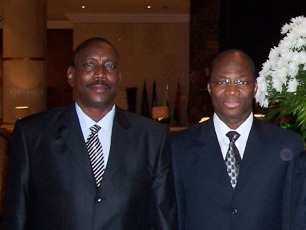Darfur rebel chief urges mediators to reconsider Doha approach
June 21, 2009 (PARIS) — A Darfur rebel chief called on the peace mediators to reconsider the current process engaged in Doha talks and adopt a comprehensive approach saying its failure should open the door for other countries to propose new meditation.

“By announcing the adjournment of the talks, the mediators wanted to save their face, but in fact the Doha talks have failed,” said Abu Garda. “This failure should encourage the mediator to reshape the process and adopt a comprehensive approach,” he added in telephone interview with Sudan Tribune from Libya.
After more than a month of meetings in Doha, GOS and JEM delegations ended negotiations without an agreement on the disputed issues. The Government wants a ceasefire agreement while Darfur rebels say a goodwill deal signed last February should be first implemented.
The mediators thought by gathering Sudanese government and the most militarily active rebel group they could stop violence after six year of war in Darfur. They also initially planned to bring to the talks two main rebels movements, JEM and the Sudan Liberation Movement of Abdel Wahid Al-Nur. They had planned to invite the other rebel groups to join one of the two movements involved in the process.
Al-Nur’s rejection and JEM request to hold separate talks led the mediation to engage a fragile process weakened by the lack of confidence, but also by other regional and external factors.
Abu Garda, who is a splinter from JEM, stressed that he had predicted this failure and had urged the mediator to rethink their bilateral because “JEM does not represent the people of Darfur and has foreign agenda.”
He warned “if the Doha mediators persist in their wrong approach, this should open the door for other countries in the region more concerned by the conflict to propose another alternatives to reach a peaceful settlement for Darfur crisis.”
“Egypt and Libya, among other, are well placed to sponsor such peace process,” he added.
Qatar had been chosen by the Arab League in September 2008 to host the talks as the joint AU-UN mediator Djibril Bassolé is in charge with the negotiations. The Doha process received the support of the African Union and United Nations as well as the international community.
However, the Qatari handling of the file irritated some countries in the region considering they should be closely associated to the process.
Abu Garda also advised the Sudanese political forces to seek more seriously to prioritizing ways to end the current conflict in Darfur saying the ongoing political process and the preparation for the general elections should be delayed till the signing of a comprehensive peace agreement in western Sudan.
“The priority should be given to the settlement of the conflict and the demands of Darfur people are clear and at hand. So a swift but serious process could end the conflict. And only after that elections should be held to engage the process of democratic transition in the country.”
The URF leader said the organization of elections under the current context would only gives the National Congress Party a new legitimacy and lead to the separation of southern Sudan. He also said there are no sufficient guaranties for free and fair elections and the NCP could to fraud the elections results.
“Otherwise we should expect more complications in the long run, and Darfur people could ask for self-determination.”
Abu Garda accused of leading an attack against African peacekeepers in 2007 appeared before a judge at the International Criminal Court (ICC) on May 18, 2009, after he voluntarily surrendered himself to The Hague based court.
In October 2007 the rebel leader announced his defection from JEM and formed the JEM Collective Leadership. He blamed the JEM chairman, Khalil Ibrahim at the time for a series of “conspiracies”.
In a reunification process held in Juba and sponsored by the former Darfur peace mediators Abu Garada and some four other factions established the United Resistance Front (URF). He was designated as chairman of the front on Tuesday 8 April 2008.
(ST)
